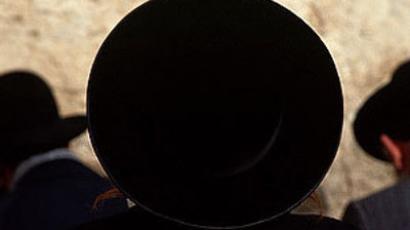Widespread anti-Semitism overlooked as Ukrainian election looms
As the Ukrainian presidential election campaign gathers steam ahead of the January vote, its Jewish population has declared that anti-Semitism and intolerance is on the rise in the country.
The Jewish community claims some politicians and their supporters are using anti-Semitic slogans and say other candidates are failing to speak out against it.
The antagonism has become particularly visible this autumn, when, as every year, thousands of Jewish pilgrims from across the world dance in the streets of Uman in Ukraine – a sacred place for Hassidic Jews. The community says these festivities are a sign of religious tolerance in modern-day Ukraine.
However, some in the west of the country share a different view.
In the town of Uzhgorod, nationalists threw eggs and waved banners with anti-Semitic slogans at a politician with a Jewish background who was rallying with supporters.
The town’s mayor, who is also running for president, is unashamed:
“This politician thinks that these elections are being held in Israel,” boils over presidential candidate Sergey Ratushnyak, current mayor of Uzhgorod. “He is putting his campaign tents in our beautiful city. This is Ukraine and it has its laws, and he must obey it.”
Such ideas have a following in western Ukraine, where some politicians believe there is a Zionist conspiracy against their country.
“Today, Nazi war criminals walk freely on the streets of German cities, because Germany imposed an amnesty on all of its war criminals,” claims Rostislav Novozhenets, Lvov regional Rada deputy. “But now they are driven by Zionists to find a scapegoat country, listing Ukraine as one of them.”
On occasion, this wave of xenophobia reaches other, more tolerant parts of the country. Five years ago a University in Kiev called MAUP awarded the former leader of the Klu Klux Klan David Duke with a history degree – something Ukraine’s Jewish community is still infuriated about.
“The MAUP was an anti-Zionist project, sponsored from abroad, mostly from Arab countries,” insists Arkady Monastyrsky, chairman of Ukraine’s Jewish Fund. “The academy united many anti-Semitic writers, whose works could still be found in Kiev’s book stores. Despite that, we urged the authorities to stop MAUP’s propaganda,” he adds.
As the presidential campaign continues in Ukraine, opponents use different, at times dirty, methods to garner votes. Using anti-Semitic slogans, according to the Jewish community, is nothing new here.
Arkady Monastyrsky remembers that “During the previous campaign, one writer alleged that Prime Minister Timoshenko is also Jewish. This is not true. So such methods are often being used here to discredit someone.”
At the same time, Ukraine has a law prohibiting racism and religious hatred which, if broken, is punishable by three years in prison.
Ukraine’s Jewish community is bewildered why none of the presidential candidates is speaking out against anti-Semitism during the campaign. They say this could win the votes of a quarter of a million Jews living in the country. And in a race as tight as it is in Ukraine, these could prove to be the most crucial votes come election day.













